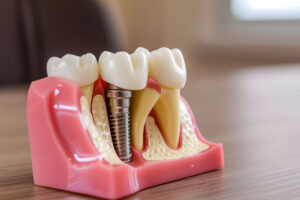Dental implants come in all sorts of shapes and sizes, and understanding the different options will help you find the right choice for your dental needs. One of the most common options is an all-on-4 implant.
How does this work? It is essentially a type of dental implant that involves your dentist attaching four implants on your bottom or top jaw and using these to anchor an entire row of dentures. Keep reading to find out all about this helpful procedure.
How Much Does an All-on-4 Implant Cost?
The exact costs will greatly depend on the materials you pick and your current dental health. First of all, you will need to decide between acrylic and porcelain implants. Acrylic is a type of synthetic material laid over a titanium framework. It is strong and lightweight. Generally, it costs between $20,000 to $30,000 per jaw to get acrylic implants.
Most people find acrylic to be fairly realistic already, but if you want the most realistic possible choice, you will want implants made of porcelain. In addition to mimicking the shape and color of real teeth perfectly, porcelain implants also last a little longer than acrylics. Due to their added benefits, you can expect to pay about $5,000 more per jaw for porcelain implants, bringing the whole cost up to somewhere between $25,000 and $35,000.
What Should You Expect When You Get All-On-4 Implants?
The idea of getting dental implants might sound intimidating, but it is really quite simple. Your dentist will be with you every step of the way, making sure that the experience is pain-free and convenient. Every implant procedure will follow these five steps.
Step 1 Your dentist will give you an anesthesia to make sure you do not feel discomfort during the procedure. Some dentists may just numb your mouth, but if you have anxiety, you can ask for general anesthesia that entirely sedates you during the procedure.
Step 2 Your dentist will get your mouth ready for the implant installation. They will gently clean away any infected tissue in the gums or jaw. If you have any decaying teeth that need to be removed, they will go ahead and take these out now.
Step 3 Now it is time for your dentist to install the implants. They will make a small incision in your mouth and screw titanium posts into the jawbone. For most patients, they will place two on either side, one at the front and one at the back.
Step 4 Once the implants are in place, the doctor will suture all the incisions. Then their staff will help you recover from the anesthesia and give you instructions on post-operative care.
Step 5 After your mouth heals around the implants, the dentist will fit you for dentures at a later time. It will usually be at least a few months, because they want to give the implants plenty of time to stabilize.
What’s It Like to Recover From Dental Implant Surgery?
The first hour or so after surgery, you may still feel a little woozy from anesthesia. The dentist will give you gauze to place in your mouth, so you can gently bite down to stop the bleeding. After the first hour or so, it may be possible to remove the gauze.
It is important to be very gentle with your mouth right after the surgery. When you go home, do not touch the area, brush it with a toothbrush, or rinse out the mouth at first. Avoid eating for several hours after surgery. When you do eat, stick to liquid foods like smoothies or pureed soups at first. If your dentist gave you a medicated rinse, use it to reduce bacteria buildup.
About 24 hours after surgery, you can rinse your mouth with a solution of one tablespoon of salt in eight ounces of water. Doing this two to three times a day will help prevent infection.
It is important to take it easy while recovering. Avoid physical activity, bending down, or picking up anything heavy. Try to keep your head propped up at first, instead of lying flat on your back. If you usually smoke, avoid it for a few days because this can impair healing.
What Can You Do to Handle Common Post-Surgery Problems?
Pain
An unfortunate reality of any surgery is that there will be some discomfort. However, your dentist should be prepared to assist you with this problem. They will typically provide you with a pain medication prescription. Those who do not want to take prescription painkillers can also use over the counter pain medications to help with bleeding. You can also put a cool ice pack on the painful area to help numb it a little if desired. To keep pain from worsening, avoid strenuous activity or eating any firm or crunchy foods.
Swelling and Bruising
This is perfectly normal after any major surgery. Generally, it will peak at around two to three days after surgery and then improve. Placing an ice pack on the area can help prevent swelling and bleeding.
Bleeding
Any major bleeding should stop within a few hours of surgery. To manage bleeding, gently bite down on a gauze pack placed over the surgical site. If bleeding persists, replace the gauze pack with a moist black tea bag for a half hour. It’s also helpful to sit upright and avoid moving around too much.
Nausea
Many patients report some nausea due to anesthesia, pain medications, or swallowed blood. If a person is feeling very queasy, small sips of a carbonated beverage can help. Ginger ale is particularly useful since ginger can calm the stomach.
Hunger
It can be hard to get enough food in the first few days, due to discomfort. Your dentist should give you a list of suggested foods, so you can make sure you are eating enough. On the first few days, you can use smoothies, juice, pudding, applesauce, and soup to stay full. You can then transition to soft foods like rice, mashed potatoes, and scrambled eggs.
Dry, Stiff, or Sore Mouth
Having gauze in your mouth for a while can start to feel a little uncomfortable, but it is important to use it because it helps with the bleeding. If your mouth starts to feel dry, chapstick or lip balm can help with hydration. Sipping water slowly can help soothe a sore, dry throat as well. If your jaw starts to feel stiff from being held open for so long, use gentle jaw stretches to loosen muscles.
Are There Any Complications You Should Be Aware Of?
Most patients will heal just fine, but there is a slight risk of complications. Being aware of them can help you seek treatment from your dentist as soon as possible if the complications do occur.
The most common issue is simply trouble healing from the surgery. Some people may get infections while others may find it hard to stop the bleeding at the surgical site. Keep an eye out for painful swelling, seeping pus, blood flowing more than a few hours after surgery, red lines radiating away from the surgical site, or foul smells. If you notice these signs of poor healing, call your dentist right away.
In some cases, the patient’s bone may simply refuse to accept the implant. If the implant does not integrate with the bone, it may remain loose and fail to support the denture. Eating healthy, avoiding tobacco, and getting enough calcium can all help reduce the risk of this happening. If it does occur, treating it is typically as simple as removing the implant and reinserting a new one in a different spot.
Dental implant failure can happen once the implant is in place and a denture is installed. Generally, failure happens due to problems like gum disease. If your mouth is not healthy, it may start to reject the implant. If this does happen, your dentist will need to remove it and replace it.
Do Most Patients Like Their All-On-4 Dental Implants?
Do these complications have you worried? Fortunately, they are very rare. You can get a more accurate idea of what it will be like to have all-on-4 dental implants by hearing from other patients who have given them a try.
According to one patient posting on RealSelf.com, all-on-4 implants feel exactly like her real teeth, except for that she no longer has to deal with pain. The process of getting them was fast and easy for her.
Another patient reports that the all-on-4 implant is the next best thing to having original, healthy teeth. They look completely natural, even around the gums, so she can be confident that her smile looks great.
How Can You Save Money on the Costs?
For most patients, the only thing to worry about with all-on-4 implants is the cost. Fortunately, there are many ways to address this issue. Many dentists offer a discount if you get the whole procedure done at one office, instead of getting your implants and your dentures installed at separate businesses. This can be a great way to save money.
Keep in mind that dental implants are often covered by insurance, so you may want to check with your plan to see how much it costs. For those who feel an all-on-4 is still too pricey for their needs, G4 implants may be a better choice. These are a similar type of implant, but they are less expensive because they are permanent as soon as they are installed.
Another way of saving money is with dental tourism. This involves going abroad to another country known for their dental procedures. This gives you the chance to get a vacation while avoiding the abnormally high prices of the United States healthcare system. Even when you factor in the price of travelling, dental tourism can still be cheaper than getting your implants at home.
Travelling to another country for dental implants does pose some potential risks though. It is important to research your options thoroughly. Look for companies that specialize in dental procedures for foreigners, since they can help arrange things like translators and lodging to make your experience more convenient.
Final Thoughts
All-on-4 dental implants can be an excellent option when your entire upper or lower jaw needs tooth replacements. Their semi-permanent nature means you get stable, natural looking teeth that do not require a lot of extra care. As long as you take the time to research your options and find an affordable and reliable dentist, you will find that all-on-4 implants can give you the smile you’ve always dreamed of.



